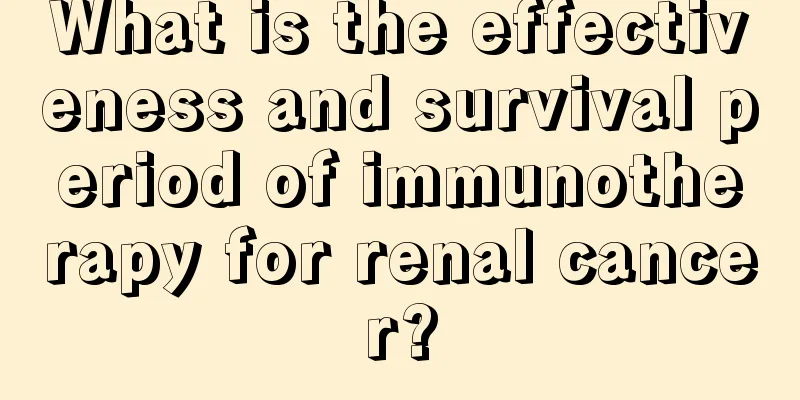What is the effectiveness and survival period of immunotherapy for renal cancer?

|
The effectiveness and survival of kidney cancer immunotherapy vary from person to person. Studies have shown that immunotherapy has a certain effect on kidney cancer, but the specific effect varies from person to person. 1. Principles and effects of immunotherapy PD-1 and PD-L1 inhibitors are at the heart of immunotherapy. These drugs work by removing the suppression of the immune system by cancer cells, allowing the body's own immune cells to more effectively attack cancer cells. Imagine the immune system is like an army, and these inhibitors are like tools to remove the enemy's camouflage, allowing the army to strike its target more accurately. 2. Clinical research and effectiveness Current clinical studies have shown that immunotherapy can be effective in some kidney cancer patients at a rate of 20% to 30%. This means that about a quarter of patients may benefit from it. Although this number may not seem high, it is an important breakthrough for patients with advanced kidney cancer. 3. Prolonged survival For kidney cancer patients receiving immunotherapy, the extension of survival is a key indicator. After treatment, some patients have significantly extended their survival, and some even exceed two years. For advanced patients, this means that they can spend more time with their families and enjoy life. 4. The importance of individual differences Each patient's response is unique, and the effectiveness of immunotherapy may vary from person to person. Genetics, lifestyle, and other health factors can affect how well treatment works. When choosing a treatment plan, your doctor will usually personalize it to your patient's specific circumstances. 5. Risks and Challenges Although immunotherapy brings hope, it also comes with risks. Overactivation of the immune system may lead to autoimmune diseases and side effects such as rashes and abnormal liver function. Patients need to be closely monitored during treatment and the treatment plan needs to be adjusted in a timely manner. 6. Future Outlook The application of immunotherapy in kidney cancer is still in the exploratory stage, and there may be more research and clinical trials in the future to optimize treatment options. Scientists are working hard to find more effective combination therapies to improve efficacy and prolong survival. 7. Patient involvement and decision making It is very important for patients with kidney cancer to understand the possibilities and limitations of immunotherapy. When discussing treatment options with their doctors, patients need to actively participate and understand the pros and cons of different treatment options to make the best choice for them. Immunotherapy provides a new treatment option for kidney cancer patients. Although the current efficacy and survival extension are limited, its potential cannot be ignored. Through continuous research and improvement, it may bring hope to more patients in the future. |
<<: What is the survival rate of rectal cancer
>>: Symptoms and measures for advanced pancreatic cancer
Recommend
Can I drink white wine if I have a bad stomach?
Liquor is indispensable when entertaining guests,...
Can I eat frozen breast milk?
The amount of breast milk produced by mothers var...
How about bird's nest skin care products
Bird's nest is a kind of food that was introd...
What are the benefits of eating loach for men
As a common river delicacy, loach has very tender...
How to take care after brain cancer surgery
For malignant brain tumors, regular checkups are ...
What is the normal value of alpha-fetoprotein?
The alpha-fetoprotein value for adults should be ...
Can I drink alcohol when I have thyroid nodules
As we all know, if our body is sick, many bad liv...
What are the effects of tea tree pure essential oil
Tea tree essential oil is a specialty of Australi...
What are the symptoms of dystonia?
Dystonia syndrome is also called dystonia. During...
There is noise in the ears
The ears can hear all sounds from the outside wor...
What are some good appetizers for kids?
Some babies will become anorexic or take a very l...
It doesn’t matter if you can’t cook, I’ll teach you 10 tricks to “cheat” food
But you don’t know how to cook fish-flavored pork...
How to prevent lung cancer from recurring and metastasizing? Recommended TCM treatments for lung cancer
How to prevent lung cancer from recurring and met...
How to clean earplugs
In daily life, earplugs are a very common daily n...
Is bleeding the main symptom of cervical cancer? What are the measures to prevent cervical cancer?
There are often no obvious symptoms in the early ...









